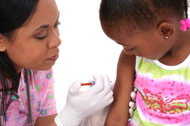This news item expired on Friday, April 29, 2016 so the information below could be outdated or incorrect.
Disease prevention is the key to public health. It is always better to prevent a disease than to treat it. Vaccines prevent disease and save lives in the people who receive them.
Why vaccinate?
Many of the diseases that were once common in this country are now rare. Vaccines control diseases including polio, measles, diphtheria,  pertussis (whooping cough), rubella (German measles), mumps, tetanus, and Haemophilus influenzae type b (Hib).
pertussis (whooping cough), rubella (German measles), mumps, tetanus, and Haemophilus influenzae type b (Hib).
Unfortunately, the viruses and bacteria that cause these diseases still exist. If we didn’t vaccinate against these diseases, we would soon see outbreaks of the disease again.
Don’t babies have immunity to disease from their mother?
It’s true that newborn babies are immune to many diseases because they have antibodies they got from their mothers. However, this immunity may last between a month and about a year. Young children do not have mother’s immunity against some vaccine-preventable diseases, such as whooping cough.
Why are vaccines so important for children?
Children should get vaccines for 3 important reasons:
- If a child is not vaccinated and is exposed to a disease germ, the child’s body may not be strong enough to fight the disease. Before vaccines, many children died from diseases that vaccines now prevent, such as whooping cough, measles, and polio. Babies are now protected by vaccines, so we do not see these diseases as often.
- Immunization slows down or stops disease outbreaks.
- Immunizing children helps to protect the health of our entire community, especially those people who are not immunized.
Shouldn’t everyone be immunized?
Not everyone can be vaccinated, and some people don’t become immunized.
- Babies may be too young to be vaccinated for some diseases. (Those less than a year old cannot receive the measles vaccine, but can be infected by the virus.)
- Some children cannot be vaccinated for medical reasons, such as leukemia.
- Sometimes children are vaccinated, but their body doesn’t develop immunity.
How long must we keep immunizing?
Until disease is eliminated. Unless we can eliminate the disease, it is important to keep immunizing. Even if there are only a few cases of disease today, if we take away the protection given by vaccination, more and more people will be infected and will spread disease to others. Soon we will undo the progress we have made over the years.
What if we stopped vaccinating?
Diseases that are almost unknown would stage a comeback. Before long we would see epidemics of diseases that are nearly under control today. More children would get sick and more would die.
For more information about vaccine preventable diseases go to the Vaccines and Immunizations section of the CDC website or visit the Children’s Hospital of Philadelphia website.